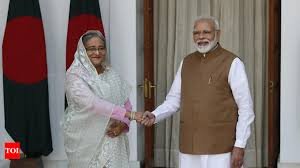Sheikh Hasina’s hasty and unceremonious exit from Bangladesh has not only hurt the Indian government but also posed the biggest foreign policy challenge in recent times in the neighbourhood, making this year’s turmoil in relations with the Maldives look like a walk in the park.

From India’s perspective, despite her many failures and increasingly volatile domestic politics, Hasina has served as a source of regional stability by keeping religious extremists and anti-India forces in check. Though NSA Ajit Doval met Hasina at the Hindon airbase, till late evening there was no official reaction from India on the developments in Dhaka, which had described the protests against Hasina as an internal matter.
According to reports from Dhaka, the interim government to be formed by the army in the near future will not include Hasina’s Awami League, while representatives of the opposition Bangladesh Nationalist Party (BNP) and the banned Jamaat-e-Islami will be included. Jamaat is known for its ties with Pakistan but the BNP, which did not contest the elections earlier this year as it was not under the caretaker government, left no opportunity to whip up anti-India sentiments. Together they turned what began as a genuine student movement in early July into a violent countrywide agitation for regime change.
While India would hope that the military would be a moderating influence on the new government, it still has several things to worry about. Political stability in Bangladesh under Hasina allowed India to focus on economic development in the country, which the government also sees as an indispensable partner in the development of its northeastern region.

